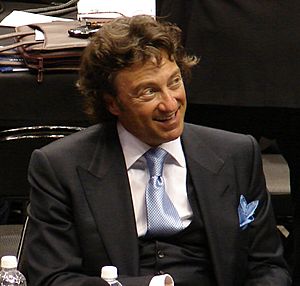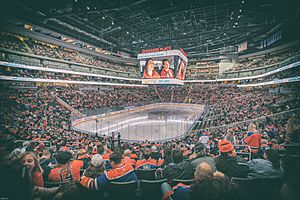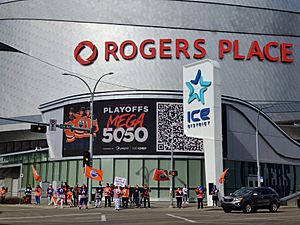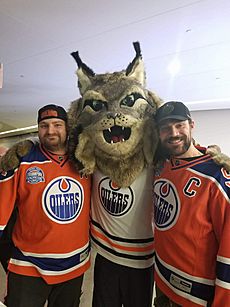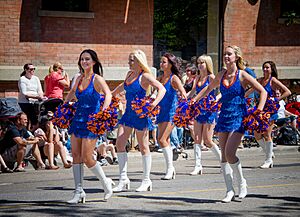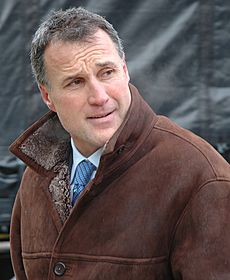Edmonton Oilers facts for kids
Quick facts for kids Edmonton Oilers |
|
|---|---|
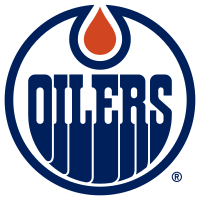 |
|
| Conference | Western |
| Division | Pacific |
| Founded | 1972 |
| History | Alberta Oilers 1972–1973 (WHA) Edmonton Oilers 1973–1979 (WHA) 1979–present (NHL) |
| Home arena | Rogers Place |
| City | Edmonton, Alberta |
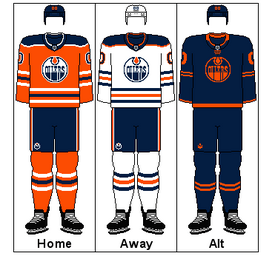 |
|
| Colours | Royal blue, orange, white |
| Media | Sportsnet West Sportsnet Oilers Citytv Edmonton 880 CHED |
| Owner(s) | OEG Inc. |
| General manager | Stan Bowman |
| Head coach | Kris Knoblauch |
| Captain | Connor McDavid |
| Minor league affiliates | Bakersfield Condors (AHL) Fort Wayne Komets (ECHL) |
| Stanley Cups | 5 (1983–84, 1984–85, 1986–87, 1987–88, 1989–90) |
| Conference championships | 9 (1982–83, 1983–84, 1984–85, 1986–87, 1987–88, 1989–90, 2005–06, 2023–24, 2024–25) |
| Presidents' Trophies | 2 (1985–86, 1986–87) |
| Division championships | 6 (1981–82, 1982–83, 1983–84, 1984–85, 1985–86, 1986–87) |
The Edmonton Oilers are a professional ice hockey team from Edmonton, Alberta, Canada. They play in the National Hockey League (NHL) as part of the Pacific Division in the Western Conference. Their home games are played at Rogers Place, which opened in 2016.
The Oilers were started in 1971 by W. D. "Wild Bill" Hunter and Dr. Chuck Allard. They began playing in the World Hockey Association (WHA) in the 1972–73 season. At first, they were called the Alberta Oilers for one year. Then, they became the Edmonton Oilers the next year. In 1979, they joined the NHL as one of four teams from the WHA.
After joining the NHL, the Oilers became one of the most successful teams. They won the Stanley Cup five times: in 1984, 1985, 1987, 1988, and 1990. They are tied with the Pittsburgh Penguins for the most championships won since the NHL and WHA merged. Only the Montreal Canadiens have won more Stanley Cups since the NHL expanded in 1967. The Oilers also won six division titles in a row from 1981–82 to 1986–87.
After a tough period, the Oilers have recently returned to the Stanley Cup Final in 2024 and 2025. They lost both times to the Florida Panthers. The team is led by star players like Connor McDavid and Leon Draisaitl.
Contents
- Team History
- Team Information
- Season Records
- Players and Staff
- Team Records
- NHL Awards and Trophies
- Home Arenas
- Broadcasters
- See also
Team History
Early Years in the WHA (1972–1979)
The Edmonton Oilers started as one of the 12 original teams in the World Hockey Association (WHA) on November 1, 1971. The team's first owners were "Wild Bill" Hunter and Dr. Charles A. "Chuck" Allard. Hunter also owned a junior hockey team called the Edmonton Oil Kings. He wanted to bring a major professional hockey team to Edmonton.
At first, the team was going to be called the "Edmonton Oil Kings." But Hunter decided to name them the "Oilers" instead. For a short time, they were called the Alberta Oilers because there were plans to play games in both Edmonton and Calgary. However, all their home games were played in Edmonton, so they changed back to the Edmonton Oilers the next year.
The Oilers won their first WHA game 7–4 against the Ottawa Nationals. Players like Al Hamilton, Dave Dryden, Blair MacDonald, and Bill Flett helped the team. In 1976, Glen Sather joined the Oilers as a player. He later became their coach and general manager for 23 years.
In 1978, the team's future changed when owner Peter Pocklington acquired a young player named Wayne Gretzky. Gretzky was underage for the NHL at the time. In his first WHA season (1978–79), the Oilers finished first in the league. However, they lost in the championship finals to the Winnipeg Jets.
Joining the NHL (1979–1983)
In 1979, the Oilers joined the National Hockey League (NHL). Three other WHA teams also joined: the Hartford Whalers, Quebec Nordiques, and the Jets. The Oilers were the only one of these four teams that never moved or changed its name.
When they joined the NHL, the Oilers were allowed to keep only a few players. But their owner, Peter Pocklington, had signed Wayne Gretzky to a long contract. This allowed the Oilers to keep Gretzky, who was a huge talent.
The Oilers were not great in their first two NHL seasons. However, they made the playoffs, which helped their young players gain experience. The team's general manager, Glen Sather, and scout Barry Fraser drafted many future stars. These players included Mark Messier, Glenn Anderson, Jari Kurri, Paul Coffey, Kevin Lowe, Grant Fuhr, and Andy Moog.
By the 1981–82 season, the Oilers were much better. Grant Fuhr became their main goalie. Wayne Gretzky set new NHL records with 92 goals and 212 points in one season. The Oilers became the first team to score 400 goals in a season. In 1982–83, the Oilers reached the Stanley Cup Final. They lost to the New York Islanders, who were the defending champions. After this season, Gretzky became the team captain.
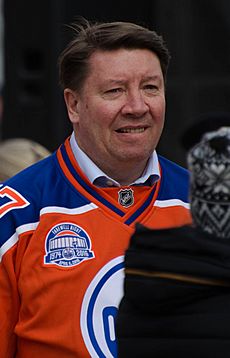
The Dynasty Years (1983–1990)
The Oilers became a true hockey dynasty in the 1983–84 season. They finished first in the NHL with a team record of 57 wins. They were the first team to have three players score 50 goals: Gretzky, Kurri, and Anderson. The team scored an NHL record 446 goals that season.
In the playoffs, the Oilers swept the Jets. They then beat the Calgary Flames in seven games. After that, they swept the Minnesota North Stars to reach the Stanley Cup Final again. This time, they beat the New York Islanders to win their first Stanley Cup. Mark Messier was named the playoff MVP.
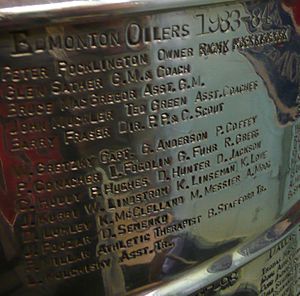
The next season, the Oilers won their second straight Stanley Cup. They beat the Philadelphia Flyers in the final. Paul Coffey set new records for goals, assists, and points by a defenseman in the playoffs. Jari Kurri tied a record for most goals in a playoff year. Wayne Gretzky won the playoff MVP award. The 1984–85 Oilers team was later voted the greatest NHL team of all time in 2017.
In the 1985–86 season, the Oilers won the first-ever Presidents' Trophy for having the best regular season record. Gretzky, Kurri, and Anderson all scored 50 goals again. However, they lost to the Calgary Flames in the second round of the playoffs. A rookie player, Steve Smith, accidentally scored an own goal in Game 7, which decided the series.
The Oilers won their second straight Presidents' Trophy in the 1986–87 season. They returned to the Stanley Cup Final and again faced the Philadelphia Flyers. The Oilers won in seven games, securing their third Stanley Cup. After the win, Gretzky famously passed the Stanley Cup to Steve Smith, helping him feel better after his mistake the year before.
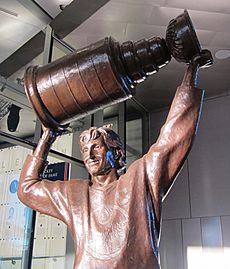
In 1987–88, the Oilers started to lose some star players. Paul Coffey was traded, and goalie Andy Moog also left. Despite these changes, the Oilers finished third in the NHL. Goalie Grant Fuhr had a great season, winning 40 games. The Oilers swept the Boston Bruins in the Stanley Cup Final to win their fourth Cup in five years. Gretzky won the playoff MVP award again. After the win, Gretzky started a tradition of having the whole team take a photo with the Stanley Cup on the ice.
Life After Gretzky (1988–1990)
On August 9, 1988, in a shocking trade, Wayne Gretzky was traded to the Los Angeles Kings. The Oilers also sent Marty McSorley and Mike Krushelnyski to the Kings. In return, the Oilers received money, young player Jimmy Carson, and several draft picks. The trade happened because the owner, Peter Pocklington, did not want to risk Gretzky leaving the team for free later.
The loss of Gretzky affected the team in the 1988–89 season. The Oilers finished third in their division. Mark Messier became the new team captain. In the playoffs, the Oilers faced Gretzky's Kings in the first round. The Kings won the series in seven games.
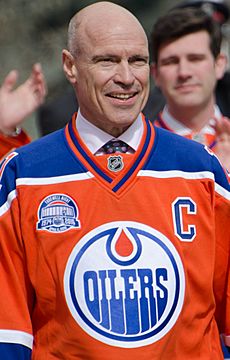
The Oilers made more changes in the 1989–90 season. John Muckler became the new head coach. Goalie Grant Fuhr was injured, and Bill Ranford became the main goalie. The Oilers traded Jimmy Carson for players like Petr Klima, Adam Graves, and Joe Murphy. The team improved and finished fifth overall in the NHL.
In the playoffs, the Oilers beat the Jets and then swept the Los Angeles Kings. They then beat the Chicago Blackhawks to reach the Stanley Cup Final again. They faced the Boston Bruins and won the series in five games. This was their first Stanley Cup win without Gretzky. Bill Ranford won the playoff MVP award for his excellent goaltending.
A Period of Change (1990–1996)
After their 1990 Cup win, more key players left the Oilers. Jari Kurri went to play in Italy for a season. Grant Fuhr was suspended for 60 games. The team still made the playoffs in 1990–91, beating the Flames and Kings. But they lost in the conference finals to the Minnesota North Stars.
Before the 1992 season, more stars were traded, including Fuhr, Glenn Anderson, and Kurri. Mark Messier was also traded to the New York Rangers. Kevin Lowe became the new captain. Despite losing so many players, the Oilers still made it to the conference finals for the third straight season. They beat the Kings and Vancouver Canucks before being swept by the Chicago Blackhawks.
After this, the Oilers struggled for several years. They missed the playoffs for the first time as an NHL team in 1992–93. They did not return to the playoffs for four years.
Back to the Playoffs (1996–2006)
In 1996–97, the Oilers made the playoffs again, thanks to great goaltending from Curtis Joseph. They upset the Dallas Stars in the first round, winning Game 7 in overtime. However, they lost to the Colorado Avalanche in the next round. In 1997–98, Joseph led them to another first-round upset against Colorado. But they lost to the Stars in the second round.
The Oilers faced financial problems during this time. In 1998, the team was almost sold and moved to Houston. But a group of local business people, called the Edmonton Investors Group, bought the team. This kept the Oilers in Edmonton.
On November 22, 2003, the Oilers hosted the 2003 Heritage Classic. This was the first outdoor regular season hockey game in NHL history. They played against the Montreal Canadiens at Commonwealth Stadium. More than 55,000 fans watched the game, setting an NHL attendance record. The Oilers lost 4–3.
After the 2004–05 season was cancelled due to a player lockout, new rules helped the Oilers. A league-wide salary cap meant all teams had to spend similar amounts of money. This helped the Oilers, who had always had a smaller budget. They were able to get new players like Chris Pronger and Michael Peca for the 2005–06 season.
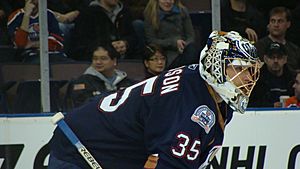
The team had a strong second half of the season. They made the playoffs as the last seed in the Western Conference. In the first round, they upset the Detroit Red Wings, who had the best record in the league. Then, they beat the San Jose Sharks and the Mighty Ducks of Anaheim to reach the 2006 Stanley Cup Final.
In the Final, the Oilers played the Carolina Hurricanes. They lost their starting goalie, Dwayne Roloson, to injury in Game 1. Despite falling behind in the series, the Oilers fought back to force a Game 7. However, they lost the final game 3–1, and the Hurricanes won the Stanley Cup.
A Decade of Challenges (2006–2015)
After the 2006 Final, many Oilers players left the team. Chris Pronger asked for a trade and was sent to the Anaheim Ducks. Many other players left as well. The Oilers struggled in the 2006–07 season, finishing 11th in the Western Conference.
In 2008, Daryl Katz, who owned a pharmacy company, bought the team from the Edmonton Investors Group. The Oilers continued to miss the playoffs for many years. They often finished at the bottom of the league standings. This meant they had high draft picks.
With these high picks, the Oilers drafted talented young players like Taylor Hall (2010), Ryan Nugent-Hopkins (2011), and Nail Yakupov (2012). These players were meant to help rebuild the team. However, the team still struggled to win games.
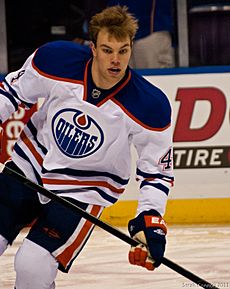
In 2013, Andrew Ference became the team captain. The City of Edmonton council approved a deal to build a new arena downtown. This new arena, called Rogers Place, opened for the 2016–17 season.
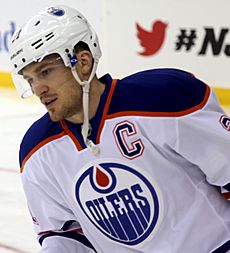
The Oilers continued to struggle, finishing last in the NHL in 2014–15. This was their worst season as an NHL team.
The McDavid–Draisaitl Era (2015–Present)
The Oilers won the 2015 draft lottery, giving them the first overall pick. They used this pick to draft Connor McDavid, a highly talented young player. This was their fourth time winning the lottery in six seasons.
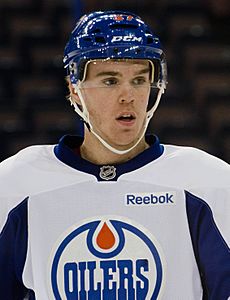
After drafting McDavid, the Oilers made more changes. Peter Chiarelli became the new general manager. Todd McLellan was named the new head coach. In 2016, the Oilers traded Taylor Hall to the New Jersey Devils for defenseman Adam Larsson. They also signed Milan Lucic. On October 5, 2016, 19-year-old Connor McDavid was named the 15th captain of the Oilers. He became the youngest team captain in NHL history.
The 2016–17 season was a big success. The Oilers made the playoffs for the first time in 11 years. They finished with a strong record, thanks to McDavid's 100-point season and great play from Leon Draisaitl and Patrick Maroon. McDavid led the league in points and assists, winning the Art Ross Trophy and Hart Memorial Trophy as the league's most valuable player. Goalie Cam Talbot also set a new team record with 42 wins.
In the first round of the playoffs, the Oilers beat the San Jose Sharks. This was their first playoff series win since 2006. However, their playoff run ended in the second round when they lost to the Anaheim Ducks in Game 7.
In 2017, the Oilers signed McDavid and Draisaitl to long-term contracts. Despite high hopes, the team missed the playoffs in 2017–18. In 2019, Peter Chiarelli was removed as general manager, and Ken Holland took over. Dave Tippett became the new head coach.
Recent Success and Stanley Cup Final Appearances (2020–Present)
In the 2019–20 season, the Oilers showed improvement. The season was paused due to the COVID-19 pandemic. Edmonton was chosen as one of the host cities for the 2020 Stanley Cup playoffs. The Oilers qualified for the playoffs but were upset by the Chicago Blackhawks in the first round.
In the 2020–21 season, the Oilers finished second in their division. Connor McDavid had an amazing season with 105 points in just 53 games. He won his second Hart Trophy as the league's most valuable player. Leon Draisaitl also had a great season with 84 points. However, the Oilers were swept in four games by the Winnipeg Jets in the first round of the playoffs.
In the 2021–22 season, the Oilers had their first 40-win season since 2017. McDavid had a career-high 123 points. The Oilers beat the Los Angeles Kings in the first round of the 2022 Stanley Cup playoffs. Then, they faced their big rival, the Calgary Flames, in the second round. This series was part of the famous "Battle of Alberta". The Oilers won in five games. They reached the conference finals for the first time since 2006 but were swept by the Colorado Avalanche.
In the 2022–23 season, McDavid, Draisaitl, and Ryan Nugent-Hopkins all scored 100 points. This was the first time since 1995–96 that three players on one team reached 100 points. McDavid had a career-high 153 points. The Oilers won 50 games for the first time since 1986–87. They beat the Kings in the first round of the playoffs again but lost to the Vegas Golden Knights in the second round.
The 2023–24 season started slowly for the Oilers. They changed head coaches, bringing in Kris Knoblauch. Under Knoblauch, the team went on a 16-game winning streak. Zach Hyman scored a personal best 54 goals. Connor McDavid became the fourth player since 1990–91 to record 100 assists in a single season. The Oilers beat the Kings, Vancouver Canucks, and Dallas Stars in the playoffs. They won their eighth Clarence S. Campbell Bowl and reached the Stanley Cup Final for the first time since 2006. They faced the Florida Panthers and lost in seven games after being down 3–0 in the series. McDavid won the Conn Smythe Trophy as the playoff MVP.
In July 2024, general manager Ken Holland and the Oilers decided to part ways. Stan Bowman was hired as the new general manager.
Team Information
Jerseys and Logos
The Oilers' original logo from 1972 had blue and orange colors. Orange was the main color, and blue was used for details. For a short time, the jerseys said "ALBERTA" instead of player names.
In the 1974–75 season, the jersey changed to mostly blue with orange trim. The logo on the jersey had a white oil drop on an orange background. When the team joined the NHL in 1979, this blue and orange design became their most famous look.
In 1996, the team colors changed to midnight blue and copper with red trim. The "Rigger" logo was added to the shoulders. In 2001, the Oilers introduced a new alternate jersey designed by Todd McFarlane. This jersey was midnight blue with silver/grey and featured a flying gear logo.
In 2008, the Oilers brought back a jersey that looked like their old blue and orange dynasty-era uniform. This became their main home jersey in 2009–10. In 2015–16, they introduced a new orange alternate jersey, which became very popular with fans. This orange jersey became their main home jersey in 2017–18.
For their 40th NHL anniversary in 2018–19, the Oilers wore their classic 1980s blue jerseys for some games. They also introduced a new midnight blue alternate jersey in 2019–20. In 2020–21, they released a "Reverse Retro" jersey, which was a white version of their 1980s jersey with orange and blue swapped.
Starting in 2022–23, the Oilers brought back the 1980s blue and white jerseys as their main uniforms. They also had a second "Reverse Retro" jersey that looked like the 2001 alternate but with orange instead of silver. For the 2023 Heritage Classic, the Oilers wore special uniforms inspired by the 1952 Canadian Olympic team.
Anthem Singer
From 1981 to 2011, Paul Lorieau was the Oilers' anthem singer. Since 2013, the anthem singer has been Robert Clark, an opera singer. During playoffs, Clark sings the anthems from the crowd.
Team Mascot
The Oilers' mascot is a Canadian lynx named Hunter. He was introduced on September 26, 2016. The lynx was chosen because many of them live in Alberta. His name, Hunter, honors the team's original owner, William "Wild Bill" Hunter. Hunter wears jersey number 72, which is the year the Oilers were founded. He uses a drum to get the crowd to chant "Let's Go Oilers!"
Oilers Octane (Former Cheerleading Team)
The Oilers Octane was the cheerleading team for the Edmonton Oilers. They were the first cheer squad for a Canadian NHL team. The team started on December 14, 2010. The first team had 19 women, aged 18 to 29.
In August 2016, the Oilers Entertainment Group decided to stop having the Octane. They wanted a new way to improve the fan experience as the team moved to Rogers Place. They announced auditions for a new group of "brand ambassadors" called the Oilers Orange and Blue Ice Crew. This new group includes both men and women.
Team Rivalries
The Oilers have two main rivalries in the NHL: against the Calgary Flames and the Los Angeles Kings.
Calgary Flames
The Oilers' rivalry with the Flames is called the "Battle of Alberta". It started because the two teams played each other often in the playoffs during the 1980s. The Oilers usually won these games, but the Flames did beat them in 1986.
Los Angeles Kings
The Oilers and Kings had a strong rivalry from the early 1980s to the early 1990s. This was due to many playoff games between them. The rivalry became even more famous when Wayne Gretzky and Marty McSorley were traded from Edmonton to Los Angeles. This rivalry has become exciting again in recent years.
Season Records
This is a partial list of the last five seasons completed by the Oilers. For the full season-by-season history, see List of Edmonton Oilers seasons
Note: GP = Games played, W = Wins, L = Losses, OTL = Overtime Losses/Shootout Losses, Pts = Points, GF = Goals for, GA = Goals against, Finish = Division finish, Playoffs = Playoff result
| Season | GP | W | L | OTL | Pts | GF | GA | Finish | Playoffs |
| 2020–21 | 56 | 35 | 19 | 2 | 72 | 183 | 154 | 2nd, North | Lost in first round, 0–4 (Jets) |
| 2021–22 | 82 | 49 | 27 | 6 | 104 | 290 | 252 | 2nd, Pacific | Lost in conference finals, 0–4 (Avalanche) |
| 2022–23 | 82 | 50 | 23 | 9 | 109 | 325 | 260 | 2nd, Pacific | Lost in second round, 2–4 (Golden Knights) |
| 2023–24 | 82 | 49 | 27 | 6 | 104 | 294 | 237 | 2nd, Pacific | Lost in Stanley Cup Final, 3–4 (Panthers) |
| 2024–25 | 82 | 48 | 29 | 5 | 101 | 259 | 236 | 3rd, Pacific | Lost in Stanley Cup Final, 2–4 (Panthers) |
Players and Staff
Team Captains
Note: This list includes the Oilers' captains from both the NHL and WHA.
- Al Hamilton, 1972–1976
- Glen Sather, 1976–1977
- Paul Shmyr, 1977–1979
- Ron Chipperfield, 1979–1980
- Blair MacDonald, 1980–1981
- Lee Fogolin, 1981–1983
- Wayne Gretzky, 1983–1988
- Mark Messier, 1988–1991
- Kevin Lowe, 1991–1992
- Craig MacTavish, 1992–1994
- Shayne Corson, 1995
- Kelly Buchberger, 1995–1999
- Doug Weight, 1999–2001
- Jason Smith, 2001–2007
- Ethan Moreau, 2007–2010
- Shawn Horcoff, 2010–2013
- Andrew Ference, 2013–2015
- Ryan Smyth*, 2014 (one game)
- Connor McDavid, 2016–present
* Ryan Smyth was named captain for his final NHL game
Head Coaches
Note: This list includes the Oilers' head coaches from both the NHL and WHA.
- Ray Kinasewich, 1972–1973
- Bill Hunter, 1972–1973
- Brian Shaw, 1973–1975
- Bill Hunter, 1974–1975
- Clare Drake, 1975–1976
- Bill Hunter, 1975–1976
- Bep Guidolin, 1976–1977
- Glen Sather, 1977–1980
- Bryan Watson, 1980
- Glen Sather, 1980–1989
- John Muckler, 1989–1991
- Ted Green, 1991–1993
- Glen Sather, 1993–1994
- George Burnett, 1994–1995
- Ron Low, 1994–1999
- Kevin Lowe, 1999–2000
- Craig MacTavish, 2000–2009
- Pat Quinn, 2009–2010
- Tom Renney, 2010–2012
- Ralph Krueger, 2012–2013
- Dallas Eakins, 2013–2014
- Todd Nelson (interim), 2014–2015
- Todd McLellan, 2015–2018
- Ken Hitchcock, 2018–2019
- Dave Tippett, 2019–2022
- Jay Woodcroft, 2022–2023
- Kris Knoblauch, 2023–present
General Managers
Note: This list includes the Oilers' general managers from both the NHL and WHA.
- Bill Hunter, 1972–1976
- Bep Guidolin, 1976–1977
- Brian Conacher, 1977–1978
- Larry Gordon, 1978–1980
- Glen Sather, 1980–2000
- Kevin Lowe, 2000–2008
- Steve Tambellini, 2008–2013
- Craig McTavish, 2013–2015
- Peter Chiarelli, 2015–2019
- Keith Gretzky (interim), 2019
- Ken Holland, 2019–2024
- Jeff Jackson (interim), 2024
- Stan Bowman, 2024–present
Honored Members
Retired Numbers
The Oilers have retired eight numbers to honor special players.
| No. | Player | Position | Career | No. Retirement |
|---|---|---|---|---|
| 3 | Al Hamilton | D | 1972–1980 | October 10, 1980 1 |
| 4 | Kevin Lowe | D | 1979–1992 1996–1997 |
November 5, 2021 |
| 7 | Paul Coffey | D | 1980–1987 | October 18, 2005 |
| 9 | Glenn Anderson | RW | 1980–1991 1995–1996 |
January 18, 2009 |
| 11 | Mark Messier | LW/C | 1979–1991 | February 27, 2007 |
| 17 | Jari Kurri | RW | 1980–1990 | October 6, 2001 |
| 31 | Grant Fuhr | G | 1981–1991 | October 9, 2003 |
| 99 2 | Wayne Gretzky | C | 1978–1988 | October 1, 1999 |
Notes:
- 1 Jersey ceremony held April 4, 2001.
- 2 Gretzky's no. 99 was retired League-wide by the NHL on February 6, 2000.
Numbers Honored
- 3542 – Rod Phillips, broadcaster, 1973–2011. This number represents the 3,542 games Phillips called for the Oilers.
Edmonton Oilers Hall of Fame
In 2022, the Oilers started their own Hall of Fame. Players and staff are chosen for their important contributions to the team since 1972. The first members included Al Hamilton, Wayne Gretzky, Jari Kurri, Grant Fuhr, Paul Coffey, Mark Messier, Glenn Anderson, Kevin Lowe, Glen Sather, and Rod Phillips. Later, Lee Fogolin and Ryan Smyth also joined in 2022.
Starting in 2023, fans can help choose who gets into the Oilers Hall of Fame. In 2023, Charlie Huddy and Doug Weight were inducted. In 2024, Craig MacTavish and Randy Gregg were chosen to be inducted.
Hockey Hall of Fame Honorees
Many Oilers players and staff have been inducted into the Hockey Hall of Fame.
Twelve Oilers players are in the Hall of Fame:
- Jacques Plante (played briefly for Oilers in WHA, inducted 1978)
- Norm Ullman (played for Oilers in WHA, inducted 1982)
- Wayne Gretzky (inducted 1999)
- Jari Kurri (inducted 2001)
- Grant Fuhr (inducted 2003)
- Paul Coffey (inducted 2004)
- Mark Messier (inducted 2007)
- Glenn Anderson (inducted 2008)
- Adam Oates (played briefly for Oilers, inducted 2012)
- Chris Pronger (played for Oilers in 2006 Final, inducted 2015)
- Kevin Lowe (inducted 2020)
- Duncan Keith (played for Oilers in 2021–22, inducted 2025)
Six Oilers staff members are in the Hall of Fame:
- Glen Sather (coach/GM, inducted 1997)
- Roger Neilson (video analyst, inducted 2002)
- Rod Phillips (broadcaster, honored 2003)
- Pat Quinn (coach, inducted 2016)
- Clare Drake (coach, inducted 2017)
- Ken Holland (GM, inducted 2020)
- Ken Hitchcock (coach, inducted 2023)
Team Records
Top Scorers
These are the top-ten players in Oilers history for points, goals, and assists. Note: Pos = Position; GP = Games Played; G = Goals; A = Assists; Pts = Points; P/G = Points per game
- * – current Oilers player
Note: This list includes WHA statistics.
|
|
|
Single-Season Records
These are some of the best single-season records by Oilers players. Items marked in bold are NHL records.
- Most goals in a season: Wayne Gretzky, 92 (1981–82)
- Most assists in a season: Wayne Gretzky, 163 (1985–86)
- Most points in a season: Wayne Gretzky, 215 (1985–86)
- Most penalty minutes in a season: Steve Smith, 286 (1987–88)
- Most goals in a season, defenceman: Paul Coffey, 48 (1985–86)
- Most points in a season, defenceman: Paul Coffey, 138 (1985–86)
- Most goals in a season, rookie: Jason Arnott, 33 (1993–94)
- Most assists in a season, rookie: Jari Kurri, 43 (1980–81)
- Most points in a season, rookie: Jari Kurri, 75 (1980–81)
- Most wins in a season (goalie): Cam Talbot, 42 (2016–17)
- Most shutouts in a season (goalie): Curtis Joseph; Tommy Salo, 8 (1997–98; 2000–01)
NHL Awards and Trophies
Art Ross Trophy (Most Points)
- Wayne Gretzky: 1980–81, 1981–82, 1982–83, 1983–84, 1984–85, 1985–86, 1986–87
- Connor McDavid: 2016–17, 2017–18, 2020–21, 2021–22, 2022–23
- Leon Draisaitl: 2019–20
Conn Smythe Trophy (Playoff MVP)
- Mark Messier: 1983–84
- Wayne Gretzky: 1984–85, 1987–88
- Bill Ranford: 1989–90
- Connor McDavid: 2023–24
Hart Memorial Trophy (League MVP)
- Wayne Gretzky: 1979–80, 1980–81, 1981–82, 1982–83, 1983–84, 1984–85, 1985–86, 1986–87
- Mark Messier: 1989–90
- Connor McDavid: 2016–17, 2020–21, 2022–23
- Leon Draisaitl: 2019–20
Jack Adams Award (Best Coach)
James Norris Memorial Trophy (Best Defenceman)
King Clancy Memorial Trophy (Leadership and Community)
- Kevin Lowe: 1989–90
- Ethan Moreau: 2008–09
- Andrew Ference: 2013–14
Lady Byng Memorial Trophy (Sportsmanship)
Lester B. Pearson Award/Ted Lindsay Award (Most Outstanding Player, voted by players)
- Wayne Gretzky: 1981–82, 1982–83, 1983–84, 1984–85, 1986–87
- Mark Messier: 1989–90
- Connor McDavid: 2016–17, 2017–18, 2020–21, 2022–23
- Leon Draisaitl: 2019–20
Maurice "Rocket" Richard Trophy (Most Goals)
- Connor McDavid: 2022–23
- Leon Draisaitl: 2024–25
NHL Plus/Minus Award (Best Plus/Minus Rating)
- Charlie Huddy: 1982–83
- Wayne Gretzky: 1983–84, 1984–85, 1986–87
Vezina Trophy (Best Goaltender)
Home Arenas
- Edmonton Gardens (1972–1974)
- Northlands Coliseum (1974–2016)
- Commonwealth Stadium (2003 Heritage Classic, 2023 Heritage Classic)
- Rogers Place (2016–present)
Broadcasters
Most Oilers games are shown on TV by Rogers Media. This includes regional games on Sportsnet West and Sportsnet Oilers. National games are on Sportsnet or Hockey Night in Canada. The Oilers' broadcast area covers Alberta, Saskatchewan, Northwest Territories, and Nunavut. As of 2021, Jack Michaels does play-by-play for most TV broadcasts, with Louie DeBrusk and Gene Principe.
On the radio, games are broadcast on CHED. The announcers are Cam Moon or Jack Michaels, and Bob Stauffer. Rob Brown is an analyst.
See also
 In Spanish: Edmonton Oilers para niños
In Spanish: Edmonton Oilers para niños


